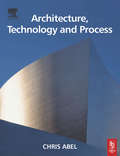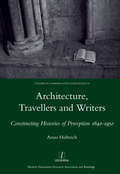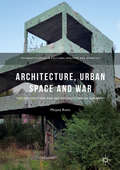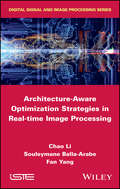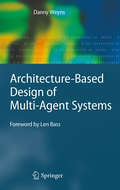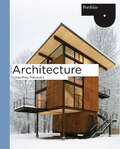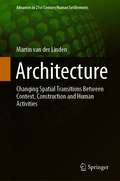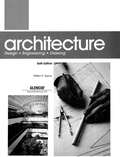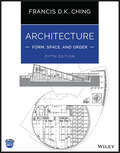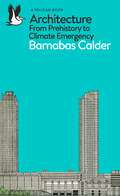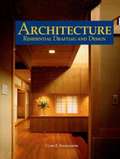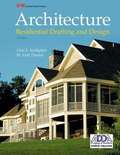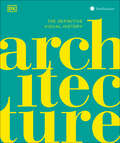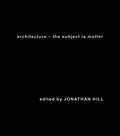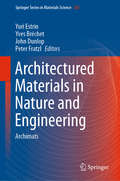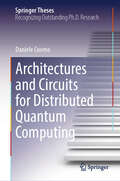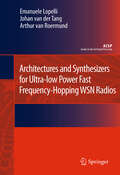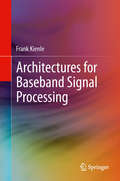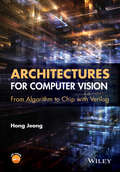- Table View
- List View
Architecture, Technology and Process
by Chris AbelThis new selection of essays follows Chris Abel's previous best selling collection, Architecture and Identity. Drawing upon a wide range of knowledge and disciplines, the author argues that, underlying technological changes in the process of architectural production are fundamental changes in the way we think about machines and the world we live in.Key topics include: new patterns of urbanism in the fast growing cities of asia pacific; metaphorical extensions of mind and body in cyberspace; the divergent European and North American values shaping Sir Norman Foster's and Frank Gehry's work, and the collaborative work methods and technologies creating the adaptable design pratices of today.
Architecture, Travellers and Writers: Constructing Histories of Perception 1640-1950
by Anne HultzschDoes the way in which buildings are looked at, and made sense of, change over the course of time? How can we find out about this? By looking at a selection of travel writings spanning four centuries, Anne Hultzsch suggests that it is language, the description of architecture, which offers answers to such questions. The words authors use to transcribe what they see for the reader to re-imagine offer glimpses at modes of perception specific to one moment, place and person. Hultzsch constructs an intriguing patchwork of local and often fragmentary narratives discussing texts as diverse as the 17th-century diary of John Evelyn, Daniel Defoe's Robinson Crusoe (1719) and an 1855 art guide by Swiss art historian Jacob Burckhardt. Further authors considered include 17th-century collector John Bargrave, 18th-century novelist Tobias Smollett, poet Johann Wolfgang von Goethe, critic John Ruskin as well as the 20th-century architectural historian Nikolaus Pevsner. Anne Hultzsch teaches at the Bartlett School of Architecture, University College London.
Architecture, Urban Space and War: The Destruction and Reconstruction of Sarajevo (Palgrave Studies in Cultural Heritage and Conflict)
by Mirjana RisticThis book investigates architectural and urban dimensions of the ethnic-nationalist conflict in Sarajevo, the capital of Bosnia and Herzegovina, during and after the siege of 1992–1995. Focusing on the wartime destruction of a portion of the cityscape in central Sarajevo and its post-war reconstruction, re-inscription and memorialization, the book reveals how such spatial transformations become complicit in the struggle for reconfiguration of the city’s territory, boundaries and place identity. Drawing on original research, the study highlights the capacities of architecture and urban space to mediate terror, violence and resistance, and to deal with heritage of the war and act a catalyst for ethnic segregation or reconciliation. Based on a multi-disciplinary methodological approach grounded in architectural and urban theory, the spatial turn in critical social theory and assemblage thinking, as well as techniques of spatial analysis, in particular morphological mapping, the book provides an innovative spatial framework for analyzing the political role of contemporary cities.
Architecture-Aware Optimization Strategies in Real-time Image Processing
by Fan Yang Chao Li Souleymane Balla-ArabeIn the field of image processing, many applications require real-time execution, particularly those in the domains of medicine, robotics and transmission, to name but a few. Recent technological developments have allowed for the integration of more complex algorithms with large data volume into embedded systems, in turn producing a series of new sophisticated electronic architectures at affordable prices. This book performs an in-depth survey on this topic. It is primarily written for those who are familiar with the basics of image processing and want to implement the target processing design using different electronic platforms for computing acceleration. The authors present techniques and approaches, step by step, through illustrative examples. This book is also suitable for electronics/embedded systems engineers who want to consider image processing applications as sufficient imaging algorithm details are given to facilitate their understanding.
Architecture-Based Design of Multi-Agent Systems
by Danny WeynsMulti-agent systems are claimed to be especially suited to the development of software systems that are decentralized, can deal flexibly with dynamic conditions, and are open to system components that come and go. This is why they are used in domains such as manufacturing control, automated vehicles, and e-commerce markets. Danny Weyns' book is organized according to the postulate that "developing multi-agent systems is 95% software engineering and 5% multi-agent systems theory." He presents a software engineering approach for multi-agent systems that is heavily based on software architecture - with, for example, tailored patterns such as "situated agent", "virtual environment", and "selective perception" - and on middleware for distributed coordination - with programming abstractions such as "views" and "roles." Next he shows the feasibility and applicability of this approach with the development of an automated transportation system consisting of a number of automatic guided vehicles transporting loads in an industrial setting. Weyns puts the development of multi-agent systems into a larger perspective with traditional software engineering approaches. With this, he opens up opportunities to exploit the body of knowledge developed in the multi-agent systems community to tackle some of the difficult challenges of modern-day software systems, such as decentralized control, location-awareness, self-adaption, and large-scale. Thus his book is of interest for both researchers and industrial software engineers who develop applications in areas such as distributed control systems and mobile applications where such requirements are of crucial importance.
Architecture: A Visual History
by Jonathan GlanceyDiscover the beautiful details, principal elements, and decorative features of every architectural style, from the Great Pyramid of Giza, Machu Picchu, and the Colosseum to the Sydney Opera House, the Gherkin, and Burj Khalifa. Architecture offers a truly worldwide look at historical and contemporary buildings, with breathtaking photography and intriguing cross-sections to enhance your view. See how and why certain features were common in specific time periods and how these amazing buildings have stood the test of time.
Architecture: An Introduction
by Geoffrey MakstutisThis book offers a thorough introduction to the entire field of architecture, outlining the steps that are normally taken in becoming a qualified architect, from initial education right through to professional practice, as well as how to apply this architectural training in other fields. Complete with feature spreads on individual projects, Architecture: An Introduction's broad, up-to-date approach unites history, theory and practice. Subjects covered include how to develop a brief with a client; taking an idea from brief to project; types of visual presentation including drawings, models and computer renderings; project planning and management; the diverse roles within a company; and the future of architectural practice. This book is a must for anyone considering taking an architecture course or just beginning one.
Architecture: An Introduction (Portfolio)
by Geoffrey MakstutisThis book offers a thorough introduction to the entire field of architecture, outlining the steps that are normally taken in becoming a qualified architect, from initial education right through to professional practice, as well as how to apply this architectural training in other fields. Complete with feature spreads on individual projects, Architecture: An Introduction's broad, up-to-date approach unites history, theory and practice. Subjects covered include how to develop a brief with a client; taking an idea from brief to project; types of visual presentation including drawings, models and computer renderings; project planning and management; the diverse roles within a company; and the future of architectural practice. This book is a must for anyone considering taking an architecture course or just beginning one.
Architecture: Changing Spatial Transitions Between Context, Construction and Human Activities (Advances in 21st Century Human Settlements)
by Martin van der LindenThe question of what architecture is answered in this book with one sentence: Architecture is space created for human activities. The basic need to find food and water places these activities within a larger spatial field. Humans have learned and found ways to adjust to the various contextual difficulties that they faced as they roamed the earth. Thus rather than adapting, humans have always tried to change the context to their activities. Humanity has looked at the context not merely as a limitation, but rather as a spatial situation filled with opportunities that allows, through intellectual interaction, to change these limitations. Thus humanity has created within the world their own contextual bubble that firmly stands against the larger context it is set in. The key notion of the book is that architecture is space carved out of and against the context and that this process is deterministic.
Architecture: Design, Engineering, Drawing
by William Perkins SpenceDesigned especially for college design courses and drafting classes, the text provides an overview of the planning and design of residential and commercial buildings
Architecture: Form, Space, and Order
by Francis D. ChingARCHITECTURE THE GOLD STANDARD IN INTRODUCTORY ARCHITECTURE TEXTS, FULLY UPDATED TO REFLECT THE LATEST DEVELOPMENTS IN THE FIELD For more than forty years, the beautifully illustrated Architecture: Form, Space, and Order has served as the classic introduction to the basic vocabulary of architectural design. In this fifth edition, more recent additions to the architectural panoply illustrate how contemporary digital and building technologies have influenced the development of architectural forms and spaces and how architectural siting and design have responded to the call for more environmentally responsible buildings. It is designed to encourage critical thought and to promote a more evocative understanding of architecture. The fifth edition is updated with many new urban design and building precedents from a diverse range of cultural and geographic areas New content focuses on the latest technology and trends in structure, construction, materials, and sustainability Includes more than 800 illustrations, many hand-drawn, which demonstrate the foundations and concepts every architect must master Architecture: Form, Space, and Order distills complex concepts of design into a clear focus and brings difficult abstractions to life. It explains form and space in relation to light, view, openings, and enclosures and explores the organization of space, and the elements and relationships of circulation, as well as proportion and scale. In addition, the text’s detailed illustrations demonstrate the concepts presented and reveal the relationships between fundamental elements of architecture through the ages and across cultures.
Architecture: From Prehistory To Post Modernity
by Isabelle Hyman Marvin TrachtenbergMoving back and forth between the long view of historical trends and close-ups on major works and crucial architectural themes, this lavishly-illustrated survey explains specific qualities of periods in depth and the complex illuminating differences between them in social, intellectual, and aesthetic terms.
Architecture: From Prehistory to Climate Emergency (Pelican Books)
by Barnabas CalderA groundbreaking history of architecture told through the relationship between buildings and energyThe story of architecture is the story of humanity. The buildings we live in, from the humblest pre-historic huts to today's skyscrapers, reveal our priorities and ambitions, our family structures and power structures. And to an extent that hasn't been explored until now, architecture has been shaped in every era by our access to energy, from fire to farming to fossil fuels.In this ground-breaking history of world architecture, Barnabas Calder takes us on a dazzling tour of some of the most astonishing buildings of the past fifteen thousand years, from Uruk, via Ancient Rome and Victorian Liverpool, to China's booming megacities. He reveals how every building - from the Parthenon to the Great Mosque of Damascus to a typical Georgian house - was influenced by the energy available to its architects, and why this matters.Today architecture consumes so much energy that 40% of the world's greenhouse gas emissions come from the construction and running of buildings. If we are to avoid catastrophic climate change then now, more than ever, we need beautiful but also intelligent buildings, and to retrofit - not demolish - those that remain. Both a celebration of human ingenuity and a passionate call for greater sustainability, this is a history of architecture for our times.
Architecture: Residential Drafting and Design
by Clois E. Kicklighter Joan C. KicklighterArchitecture: residential drafting and design provides the basic information necessary for planning various types of dwellings. The book is so organized that the content is presented in the logical order of use and is highly illustrated with the very latest products and building techniques.
Architecture: Residential Drafting and Design
by Clois E. Kicklighter Joan C. Kicklighter W. Scott ThomasArchitecture: Residential Drafting and Design provides comprehensive instruction for preparing architectural working drawings using traditional and computer-based methods. The text also serves as a reference for design and construction principles and methods. Its highly effective formatorganizes content around the design-building process, making the text easy to understand and appealing to students. The new edition of this text has been extensively revised and features new chapters covering sustainable design and building sections. New chapter features include Green Architecture, Employability, Problem Solving Case Study, and Curricular Connections to expand on chapter topics, explain currenttrends, and promote student interest. Each chapter contains sample test questions for the American Design Drafting Association (ADDA) Drafter Certification Test to help students work toward earning professional certification. The text has been enhanced with a new, colorful design and includes manynew detailed illustrations to explain topics. Each chapter includes objectives, key terms, Internet resources, review questions, and suggested activities for individuals or small groups. Many of the chapterend activities are designed to give students experience working with computer-aided draftingand design (CADD) systems.
Architecture: Residential Drafting and Design (Twelfth Edition)
by Clois E. Kicklighter W. Scott ThomasArchitecture: Residential Drafting and Design provides comprehensive instruction on traditional and computer-based methods of preparing architectural working drawings, as well as coverage of design and construction principles and methods. It is organized around the design-building process, a logical way for students to easily learn. It is intended to help build the necessary technical skills to communicate architectural ideas in an understandable, efficient, and accurate manner. Architecture: Residential Drafting and Design covers all phases of architectural drafting and design. In addition to providing information on architectural drafting, design, and construction, the text includes excellent coverage of computer-aided drafting and design (CADD), 3D parametric modeling applications, and building information modeling (BIM).
Architecture: Residential Drafting and Design (Twelfth Edition)
by Clois E. Kicklighter Joan C. Kicklighter W. Scott ThomasNIMAC-sourced textbook
Architecture: Residential Drafting and Design 13th Edition
by Clois E. Kicklighter Joan C. Kicklighter W. Scott ThomasArchitecture: Residential Drafting and Design, an ADDA-approved publication, provides comprehensive instruction for preparing architectural working drawings using traditional and computer-based methods. The text also serves as a reference for design and construction principles and methods. Featuring numerous interesting photos of residences and architectural features, this up-to-date, introductory text provides instruction in three primary areas of residential architecture: architectural design, construction methods, and architectural drafting.
Architecture: The Definitive Visual Guide (DK Definitive Cultural Histories)
by DKFrom ancient dwellings to modern high-tech skyscrapers, discover everything there is to know about the history of architecture worldwide.Covering over 6,000 years of human history, Architecture charts the most important developments in building materials, technology, design, and the social changes that have shaped the architectural landscape. Explore every significant architectural period and style in depth through critical examples. Take a tour of some of the world&’s most iconic buildings, beautifully illustrated with brilliant photography and specially commissioned CGI artworks. Dive deep into the pages of this inspiring architecture book to discover:- An innovative approach to the story of architecture using iconic examples. - Explores buildings throughout history and across the world.- A combination of creative photography and specially commissioned CGI artworks to analyze every significant architectural style.- Profiles of the latest developments in architectural practice, including &“green&” technology, such as living façades.- Published in association with the Smithsonian Institution in the US.- Optional 56-page reference section profiles key architects and contains profiles of additional important buildings.Find out why so many ancient Roman structures have withstood the test of time. Learn how the soaring ceilings of Gothic cathedrals are held up. And discover the architectural innovations that are helping to combat climate change. Architecture is the perfect book for anyone fascinated by the built world – its visual character and the factors that have formed it – and who wants to understand more.
Architecture: The Subject is Matter
by Jonathan HillThe aim of this book is to expand the subject and matter of architecture, and to explore their interdependence. There are now many architectures. This book acknowledges architecture far beyond the familiar boundaries of the discipline and reassesses the object at its centre: the building. Architectural matter is not always physical or building fabric. It is whatever architecture is made of, whether words, bricks, blood cells, sounds or pixels. The fifteen chapters are divided into three sections - on buildings, spaces and bodies - which each deal with a particular understanding of architecture and architectural matter.The richness and diversity of subjects and materials discussed in this book locates architecture firmly in the world as a whole, not just the domain of architects. In stating that architecture is far more than the work of architects, this book aims not to deny the importance of architects in the production of architecture but to see their role in more balanced terms and to acknowledge other architectural producers. Architecture can, for example, be found in the incisions of a surgeon, the instructions of a choreographer or the movements of a user. Architecture can be made of anything and by anyone.
Architectured Materials in Nature and Engineering: Archimats (Springer Series in Materials Science #282)
by John Dunlop Yuri Estrin Yves Bréchet Peter FratzlThis book deals with a group of architectured materials. These are hybrid materials in which the constituents (even strongly dissimilar ones) are combined in a given topology and geometry to provide otherwise conflicting properties. The hybridization presented in the book occurs at various levels - from the molecular to the macroscopic (say, sub-centimeter) ones. This monograph represents a collection of programmatic chapters, defining archimats and summarizing the results obtained by using the geometry-inspired materials design. The area of architectured or geometry-inspired materials has reached a certain level of maturity and visibility for a comprehensive presentation in book form. It is written by a group of authors who are active researchers working on various aspects of architectured materials. Through its 14 chapters, the book provides definitions and descriptions of the archetypes of architectured materials and addresses the various techniques in which they can be designed, optimized, and manufactured. It covers a broad realm of archimats, from the ones occurring in nature to those that have been engineered, and discusses a range of their possible applications. The book provides inspiring and scientifically profound, yet entertaining, reading for the materials science community and beyond.
Architectures and Circuits for Distributed Quantum Computing (Springer Theses)
by Daniele CuomoThis thesis treats networks providing quantum computation based on distributed paradigms. Compared to architectures relying on one processor, a network promises to be more scalable and less fault-prone. Developing a distributed system able to provide practical quantum computation comes with numerous challenges, each of which need to be faced with careful analysis in order to create a seamless integration of multiple engineered components.In accordance with hardware technologies, currently under development worldwide, telegates represent the fundamental inter-processor operations. Each telegate consists of several tasks: i) entanglement generation and distribution, ii) local operations, and iii) classical communications. Entanglement generation and distribution is an expensive resource, as it is time-consuming. The primary contribution of this thesis lies in the extensive analysis of some complex scenarios of general interest. We propose numerical models that help to identifythe interdependence between computation and communication. With the support of some of the best tools for reasoning -- i.e. network optimization, circuit manipulation, group theory and ZX-calculus -- we lay out new perspectives on the way a distributed quantum computing system should be developed.
Architectures and Synthesizers for Ultra-low Power Fast Frequency-Hopping WSN Radios (Analog Circuits and Signal Processing)
by Arthur H.M. van Roermund Emanuele Lopelli Johan van der TangWireless sensor networks have the potential to become the third wireless revolution after wireless voice networks in the 80s and wireless data networks in the late 90s. Unfortunately, radio power consumption is still a major bottleneck to the wide adoption of this technology. Different directions have been explored to minimize the radio consumption, but the major drawback of the proposed solutions is a reduced wireless link robustness. The primary goal of Architectures and Synthesizers for Ultra-low Power Fast Frequency-Hopping WSN Radios is to discuss, in detail, existing and new architectural and circuit level solutions for ultra-low power, robust, uni-directional and bi-directional radio links. Architectures and Synthesizers for Ultra-low Power Fast Frequency-Hopping WSN Radios guides the reader through the many system, circuit and technology trade-offs he will be facing in the design of communication systems for wireless sensor networks. Finally, this book, through different examples realized in both advanced CMOS and bipolar technologies opens a new path in the radio design, showing how radio link robustness can be guaranteed by techniques that were previously exclusively used in radio systems for middle or high end applications like Bluetooth and military communications while still minimizing the overall system power consumption.
Architectures for Baseband Signal Processing
by Frank KienleThis book addresses challenges faced by both the algorithm designer and the chip designer, who need to deal with the ongoing increase of algorithmic complexity and required data throughput for today's mobile applications. The focus is on implementation aspects and implementation constraints of individual components that are needed in transceivers for current standards, such as UMTS, LTE, WiMAX and DVB-S2. The application domain is the so called outer receiver, which comprises the channel coding, interleaving stages, modulator, and multiple antenna transmission. Throughout the book, the focus is on advanced algorithms that are actually in use in modern communications systems. Their basic principles are always derived with a focus on the resulting communications and implementation performance. As a result, this book serves as a valuable reference for two, typically disparate audiences in communication systems and hardware design.
Architectures for Computer Vision: From Algorithm to Chip with Verilog
by Hong JeongThis book provides comprehensive coverage of 3D vision systems, from vision models and state-of-the-art algorithms to their hardware architectures for implementation on DSPs, FPGA and ASIC chips, and GPUs. It aims to fill the gaps between computer vision algorithms and real-time digital circuit implementations, especially with Verilog HDL design. The organization of this book is vision and hardware module directed, based on Verilog vision modules, 3D vision modules, parallel vision architectures, and Verilog designs for the stereo matching system with various parallel architectures. Provides Verilog vision simulators, tailored to the design and testing of general vision chips Bridges the differences between C/C++ and HDL to encompass both software realization and chip implementation; includes numerous examples that realize vision algorithms and general vision processing in HDL Unique in providing an organized and complete overview of how a real-time 3D vision system-on-chip can be designed Focuses on the digital VLSI aspects and implementation of digital signal processing tasks on hardware platforms such as ASICs and FPGAs for 3D vision systems, which have not been comprehensively covered in one single book Provides a timely view of the pervasive use of vision systems and the challenges of fusing information from different vision modules Accompanying website includes software and HDL code packages to enhance further learning and develop advanced systems A solution set and lecture slides are provided on the book's companion website The book is aimed at graduate students and researchers in computer vision and embedded systems, as well as chip and FPGA designers. Senior undergraduate students specializing in VLSI design or computer vision will also find the book to be helpful in understanding advanced applications.
